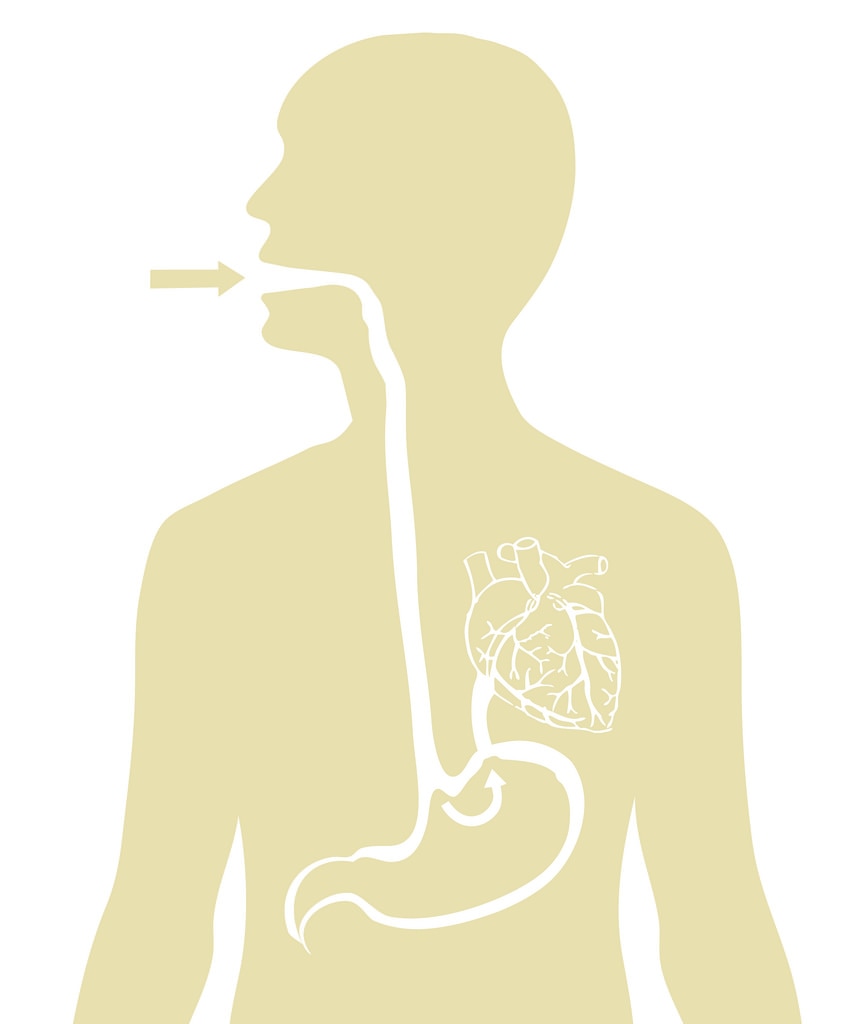Well that has to do with the composition and state of the small and large intestine. There’s anywhere from about 10-100 billion microbes present in the small and large intestine. This helps us understand why giving a probiotic or eating fermented foods makes a difference, because there’s enough probiotics present in the average capsule to replenish and encourage growth of good bacteria. Also, the small intestine is approximate 20 ft long, so it houses about 95% of the bacteria that live in our intestines. The large intestine on the other hand is only 4 ft long, but because things are moving much slower through the large intestine the bacteria layer in the mucosa can be up to 200 cells thick, compared to 1 cell thick in the small intestine. This allows this shorter stretch of organ to still accommodate 10-100 billion microbes. Research: As I mentioned before there are many studies that have been done and are currently being done on the effects of probiotics and the microbiome as a whole. If you did a simple google or pubmed search you would come up with 1000s of results. I can’t summarize all of them, but here are a few highlights: INFANTS AND PROBIOTICS Eczema, asthma and allergy have become much more of a problem over the past few decades than they ever were before. In the Swansea baby Allergy Prevention Trial they looked to see if intervening with probiotics at an early age could reduce the incidence of allergy, and atopic conditions by extension. The intervention was given to newborns for the first 6 months after birth. The outcome was a follows: Placebo group: Almost 10% of infants had atopic eczema at 6 months; Approximately 13% of infants had atopic eczema at 2 years. Probiotic group: Approximately 3% of infants had atopic eczema at 6 months; almost 6% of infants had atopic eczema at 2 years. The overall reduction of infants with allergy was 57% at 2 years. Remember, they only received treatment for the first 6 months. This demonstrates that the positive benefit of intervention goes beyond the intervention period. PROBIOTICS AND ANTIBIOTICS Most people are aware that we should take probiotics when we take an antibiotic. However, how much, when and for how long make a difference? One study, The Cambridge Clostridium difficile trial looked at the impact of probiotics to prevent/reduce C. difficile infection and associated diarrhea in patients receiving antibiotics. The outcome was as follows: Antibiotic/Placebo group: When tested at Day 28 they still had overgrowth or dysbiosis present Antibiotics followed by probiotic: They had a growth of bacteria up to Day 7, but then at Day 28 there was a significant decrease in bacterial overgrowth Antibiotics with Probiotics: There was no overgrowth of bacteria at Day 7 or 28 because the probiotics were present throughout antibiotic treatment This study demonstrates that by taking probiotics while receiving antibiotics you can decrease the chances of bacterial overgrowth occurring at all. However, it is still beneficial to intervene with probiotics later on as it will help to bring bacterial overgrowth under control.
Choices: Making sense of what’s available on the market As happens with most things in the market, as they get more popular there tends to be more people interested in developing a product for it. Over the last few years we’ve seen a huge increase in the number of probiotics available at the store. Knowing you have all these choices, how do you make the right choice for you? Well, there’s no short and easy answer to that. There are a number of factors you want to consider:
Knowing these things makes it much easier for you to select an appropriate probiotic. If you don’t know the answer to these questions or aren’t sure, then you may want to speak to a Naturopathic Doctor or other healthcare professional. When I go through this process with my patients, we figure out which probiotic (if any) might be best for them so it’s much easier to find what they need when they go to purchase a product from the health food store. Have questions about probiotics or how to improve your gut health overall? Please email me through the website ‘contact’ page or get in touch with me directly. Note: Talk to your Naturopathic Doctor today about getting assessed and treated if needed, and as always talk to your health care provider before beginning any new medication or supplement. This information is not meant to replace the advice/guidance of a medical professional, nor should it be acted upon by individuals unsupervised by the appropriate healthcare provider. References: Allen SJ et al 2014 Arch Dis Child Plummer et al 2005, Int J Antimicrob Agents 26
0 Comments
 This is a very common question I get asked whenever I introduce myself at a workshop or someone just finished reading my card or website. The running joke in my family is I had to pick some of the more ‘obscure career paths’ available just to be different. However, in all seriousness becoming a Doula as well as a Naturopathic Doctor was like fitting together two puzzle pieces when I had no idea that there was a possibility of finding that missing puzzle piece. So what is a Doula anyway? I asked my classmate one Monday when I was still in Naturopathic college. She was telling us about the amazing weekend course she'd just finished. Well it comes from the Greek, meaning a woman who serves. The term ‘Doula’ was used to describe the role of the woman or women who attended births. In some cultures, women would give birth either by themselves or with the support of other women, and those who did have attendants, tended to have better outcomes. I was fascinated! I had only known about midwives as the 'alternative' to doctor attended births in hospitals. I didn't know there were other birth professionals out there, or that it was something I might consider doing. I had considered midwifery as a career prior to choosing Naturopathic Medicine, but once that choice was made I didn't think I could meld the birth world with Naturopathic Medicine in such a complementary and harmonious way. Once I started my own journey into becoming a doula I realized that today, the term doula is a bit more recognized and is becoming more and more common place every day. A doula is now recognized as a trained and experienced professional who provides continuous physical, emotional and informational support to the mother before, during and after birth, as well as some of the postpartum period. The primary role being as a: support and resource for health and birth care. They do not constitute a replacement for a midwife or other healthcare practitioner, but are a complimentary form of healthcare for the mother and baby. What really intrigued me was the amount of research that showed how much of a benefit having a doula present provided to mom and baby. Studies have actually shown that when doulas attend births, labours are shorter, have fewer complications (like c-sections), babies are healthier and they breastfeed more easily (Hodnett et al., 2011). Even though our primary concern is for mother and by extension the Mom and baby dyad, we’re also there to help the rest of the family too. Don't worry Dad, we didn't forget about you. Hodnett et al., (2011) shows that parents who receive support can:
Having someone else present during pregnancy and birth who can help you navigate all the vast amounts of information and work with you to advocate for you and with you only increases your chances of having the best possible birth experience. My clients who work with me also get the benefit of my Naturopathic knowledge and skills. Being a Naturopathic Doctor and Doula allows me to offer so much more complete care to the families I work with, and they often elect to continue care with me as a family after the baby is born. The birth location that can impact whether I am able to utilize all my tools, but no matter the circumstances, the end goal stays the same: for Mom and baby (and family) to have the most positive start to their lives together. Have questions about doulas or whether having a doula involved in your birth is right for you? Feel free to contact me by email or by phone. I also still have a few spots left for the summer on my calendar if you’re still looking for a Doula to join your birth team. References: Hodnett ED, Gates S, Hofmeyr GJ, Sakala C, Weston J. Continuous support for women during childbirth. Cochrane Database of Systematic Reviews 2011, Issue 2. Art. No.: CD003766. DOI: 10.1002/14651858.CD003766.pub3. |
Sarah Connors
I am a Naturopathic Doctor and Doula providing care in the Kitchener-Waterloo area. I have a passion for helping people with their health issues and improving the birth experience for Moms, and their babies. I also have a life long love affair with soccer, curling, and the alto saxophone. Archives
November 2020
Categories
All
|
Photos from Rural Royalty, manu flickr2010, Ryan Dickey, wocintechchat, huskyte77, paulswansen, Black Room Photography, harum.koh, Emery Co Photo, JeepersMedia, BrownGuacamole, wellnesswildflower, JeepersMedia, vastateparksstaff, colindunn, seelensturm, /\ \/\/ /\, 50mm.za, The Simpsons (Lee, Shirley, Luke and Rachel), AGRONAUTI, aivas14, Jonathan Rolande, winnifredxoxo, juhansonin, osseous, nan palmero, Theo Crazzolara, brianfagan, TP studio, wuestenigel, torbakhopper, anka.albrecht, Michael Stern, [-ChristiaN-], franchiseopportunitiesphotos, terren in Virginia, nateOne, barnimages.com, Dun.can, wuestenigel, @lattefarsan, amandabhslater, aphrodite-in-nyc, nutritionaldoublethink, Anne Worner, donnierayjones, mikecogh, angeloangelo, Rob.Bertholf, getaiwan, Lida Rose, matsuyuki, SurFeRGiRL30, marcoverch, amsfrank, mdaltry, nutrition education, Mike Prince, Edsel L, Neighborhood Nini, philipp.alexander.ernst, Mediocre2010, homethods, quinn.anya, Gamma Man, katerha, Eric Kilby, National Institutes of Health (NIH), rcmd_cfdfw_5_2, curtis palmer, Ray in Manila, frankieleon, Airsoftpal.com, byzantiumbooks, cchana, Brian Legate, Matt Lavin, BradHinton, monpetitchouphotography, wuestenigel, alexisjordanlewis, ByEPhotos, erix!, RLHyde, return the sun, quinn.anya, mliu92, frankieleon, loudista, Lyn Lomasi, upslon, derrickbrutel, cchana, National Institutes of Health (NIH), watts_photos, marcoverch, derrickbrutel, francesbean, weegeebored, Airsoftpal.com, Etwood, wu_135, shixart1985, Ingrid Taylar, VeritasFotografie, BioDivLibrary, emmanuelmorales1, Thanks for 1.5 Million Views!!, Will Merydith, reader of the pack, RoxyHobbs, Khanelle Prod' Medias, storyvillegirl, agromonitor, Arenamontanus, six:eleven, cote, SweetOnVeg, nenoirenediaz, lucianvenutian, markhillary, anotherlunch.com, inkknife_2000, archibald jude, rawtrigger, Imaginary Museum Projects: News Tableaus, Pavel P., Courtney Emery, Thien Gretchen, physiognomist, bark, Michigan Municipal League (MML), alberth2, Merelymel13, neofob, Care_SMC, Parker Knight, B*2



 RSS Feed
RSS Feed
